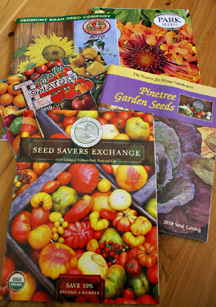Chesapeake Bay's Independent Newspaper ~ Since 1993
1629 Forest Drive, Annapolis, MD 21403 ~ 410-626-9888
Volume xviii, Issue 1 ~ January 7 - January 13, 2010
Home \\ Correspondence \\ from the Editor \\ Submit a Letter \\ Classifieds \\ Contact Us
Dining Guide \\ Home & Garden Guide \\ Archives \\ Distribution Locations \\ Advertising
![]()


The Bay Gardener
 by Dr. Frank Gouin |
Seed Catalogs Are in Season
Tips on saving money and avoiding disappointments
The seed catalogs are coming in fast and furious. Nearly every catalog offers new and improved varieties with tempting photographs. Those close-up pictures of individual flowers or vegetables make them appear outstanding and a must in your garden, but don’t let those glossy pictures and tempting descriptions sway your buying. Seed and nursery catalogs are just as notorious as household catalogs selling gadgets for selling goods that may not perform as well as described.
I like to save a few old catalogs for the purpose of comparing varieties, to see if they reappear year after year. New varieties of flowers, fruits and vegetables have had limited testing. The longer they remain listed in catalogs, the more likely they are performing as expected so that gardeners repeatedly order them. There is nothing better than the test of time in determining if varieties are satisfactory to gardeners.
 It’s fine to try growing new and improved varieties, but don’t let novelty dictate your whole order.
It’s fine to try growing new and improved varieties, but don’t let novelty dictate your whole order.
In selecting seeds for the coming year, I like spending an evening comparing the varieties each catalog offers. If the same variety appears in several catalogs, you can rest assured that that variety has wide approval and the plants perform well.
Most catalogs offer free seeds of their new and improved varieties if you order by a given date and reach certain order levels. Take advantage of these offers, and you get to test new and improved varieties without having to spend money.
Don’t order more seeds than you need. Many seeds can be stored for several years under refrigeration in sealed containers. On the other hand, many seeds do not store well. Fresh seeds always perform better than old and improperly stored seeds. Seeds stored in kitchen drawers have a very short shelf life.
Only a few seed catalogs provide percent germination, which is important information if you can get it. Seed packages for vegetable and grain crops must include, by law, percent germination while seeds for flowers and perennials are exempt.
Consider sharing fresh seeds with friends and neighbors to minimize your spending. One purchases the tomato seeds and the other the pepper seeds, and so on. Seeds, especially hybrids, can be very expensive, and by sharing them with others, you can afford to purchase fresh seeds every year.
Bay Gardener Gives Lessons
Wednesday noon lectures at Homestead Gardens, Davidsonville: 800-300-5631; www.homesteadgardens.com.
Jan. 23: Composting;
Jan. 30: Pruning.
Ask Dr. Gouin your questions at [email protected]. All questions will appear in Bay Weekly. Please include your name and address.
© COPYRIGHT 2010 by New Bay Enterprises, Inc. All rights reserved.